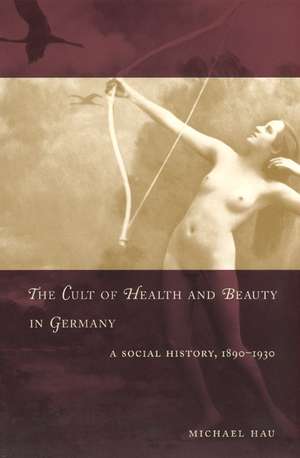The Cult of Health and Beauty in Germany: A Social History, 1890-1930
Autor Michael Hauen Limba Engleză Paperback – 2 iun 2003
From the 1890s to the 1930s, a growing number of Germans began to scrutinize and discipline their bodies in a utopian search for perfect health and beauty. Some became vegetarians, nudists, or bodybuilders, while others turned to alternative medicine or eugenics. In The Cult of Health and Beauty in Germany, Michael Hau demonstrates why so many men and women were drawn to these life reform movements and examines their tremendous impact on German society and medicine.
Hau argues that the obsession with personal health and fitness was often rooted in anxieties over professional and economic success, as well as fears that modern industrialized civilization was causing Germany and its people to degenerate. He also examines how different social groups gave different meanings to the same hygienic practices and aesthetic ideals. What results is a penetrating look at class formation in pre-Nazi Germany that will interest historians of Europe and medicine and scholars of culture and gender.
Hau argues that the obsession with personal health and fitness was often rooted in anxieties over professional and economic success, as well as fears that modern industrialized civilization was causing Germany and its people to degenerate. He also examines how different social groups gave different meanings to the same hygienic practices and aesthetic ideals. What results is a penetrating look at class formation in pre-Nazi Germany that will interest historians of Europe and medicine and scholars of culture and gender.
Preț: 289.96 lei
Nou
Puncte Express: 435
Preț estimativ în valută:
55.49€ • 57.33$ • 46.18£
55.49€ • 57.33$ • 46.18£
Carte tipărită la comandă
Livrare economică 25 martie-08 aprilie
Preluare comenzi: 021 569.72.76
Specificații
ISBN-13: 9780226319766
ISBN-10: 0226319768
Pagini: 296
Ilustrații: 48 b-w illustrations
Dimensiuni: 152 x 229 x 20 mm
Greutate: 0.4 kg
Ediția:1
Editura: University of Chicago Press
Colecția University of Chicago Press
ISBN-10: 0226319768
Pagini: 296
Ilustrații: 48 b-w illustrations
Dimensiuni: 152 x 229 x 20 mm
Greutate: 0.4 kg
Ediția:1
Editura: University of Chicago Press
Colecția University of Chicago Press
Notă biografică
Michael Hau is a lecturer in modern European history at Monash University in Australia.
Cuprins
List of Illustrations
Acknowledgments
Introduction
1 Life Reform as Bürgerliche Kultur
2 Popular Hygienic Culture, Class, and Aesthetic Norms
3 Gender and Aesthetic Norms in Popular Hygienic Culture
4 Racial Aesthetics
5 Models of Holistic Constitutionalism in Regular Medicine and Natural Therapy
6 The Constitutional Convergence: Life Reform, the "Crisis of Medicine," and Weimar Hygiene Exhibitions
7 Constitutional Typologies: Weimar Racial Science and Medicine
8 Weimar Leisure Culture: Freikörperkultur and the Quest for Authenticity and Volksgemeinschaft
Conclusion
Notes
Bibliography
Index
Acknowledgments
Introduction
1 Life Reform as Bürgerliche Kultur
2 Popular Hygienic Culture, Class, and Aesthetic Norms
3 Gender and Aesthetic Norms in Popular Hygienic Culture
4 Racial Aesthetics
5 Models of Holistic Constitutionalism in Regular Medicine and Natural Therapy
6 The Constitutional Convergence: Life Reform, the "Crisis of Medicine," and Weimar Hygiene Exhibitions
7 Constitutional Typologies: Weimar Racial Science and Medicine
8 Weimar Leisure Culture: Freikörperkultur and the Quest for Authenticity and Volksgemeinschaft
Conclusion
Notes
Bibliography
Index
